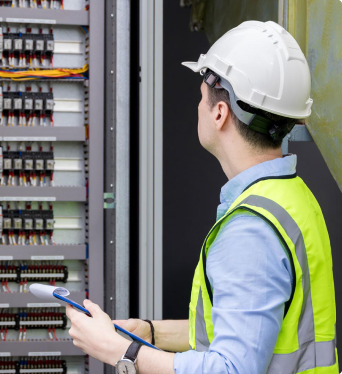

Criteria to Consider When Selecting a Panel Air Conditioner
1. Heat Loss and Load
The heat losses of electrical or electronic components inside the panel should be determined, and the panel air conditioner should have the appropriate capacity to handle this heat load. Heat loss should be calculated based on the efficiency and operational power of the components within the panel.
2. Heat Transmission Coefficient (K)
When selecting a panel air conditioner, the heat conductivity of the materials used should be taken into account. The higher the coefficient, the faster the heat transfer. Therefore, careful consideration should be given to the selection of materials inside the panel.
3. Panel Size and Placement
The size and placement of the panel are important factors in selecting a panel air conditioner. The arrangement of components inside the panel should be considered to ensure effective air circulation by the air conditioner. Optimal airflow and temperature distribution should be ensured through proper internal arrangement.
4. Environmental Conditions
The panel air conditioner should be chosen according to the external environmental conditions (e.g., outdoor temperature, humidity). The climate and working environment around the panel should be thoroughly assessed, and a suitable air conditioner should be selected accordingly.
5. Protection Class
The panel air conditioner should have a suitable protection class for the environment it will be used in. Factors like resistance to dust, moisture, or water should be considered. A protection class compatible with the environmental conditions should be chosen.
6. Energy Efficiency
Energy efficiency is crucial for prolonged use of the panel air conditioner. A high-performance air conditioner with low energy consumption should be preferred. Energy efficiency can help reduce energy costs and minimize environmental impact.
Panel Air Conditioner Calculations
1. Panel Heat Load Calculation
The total heat loss of components inside the panel should be calculated. This is related to the power loss and operational efficiency of the components inside the panel. Pr = ΔT x Sr x K Pr: Heat load inside the panel (Watt) ΔT: Temperature difference between inside and outside the panel (°C) (Te – Ti) Sr: Surface area of the panel (m²) K: Heat transmission coefficient of the cabinet (W/m² °C)
2. Internal Heat Distribution
The power generated by components inside the panel (Pd) is added to the heat load inside the panel (Pr). Pf = Pd + Pr Pf: Required cooling capacity (Watt)
3. Air Exchange
The air inside the panel should be exchanged with the outside air at a certain frequency. In this calculation, the necessary airflow (Vp) for internal air exchange is calculated. Vp = Pd / (ΔTa x 0.3) Vp: Airflow (m³/hour) ΔTa: Temperature difference between inside and outside the panel (°C) (Ti – Te)
4. Anti-Condensation Heater Power
The power of the anti-condensation heater (Pc) is calculated to prevent condensation issues within the panel. Pc = ΔTc x Sr x K Pc: Anti-condensation heater power (Watt) ΔTc: Absolute temperature difference between Te and Ti (°C) (e.g., ΔTc = |Te – Ti|)
The above calculations will assist in accurately determining the selection and capacity of a panel air conditioner. At AND Klima, we are delighted to offer support for selecting a panel air conditioner that meets your specific requirements. Additionally, you can download the calculation tool we have prepared for easy calculations from this link: Calculation Tool
Keep in mind that each application is unique, so seeking assistance from an expert HVAC engineer for your specific requirements is crucial. AND Klima provides expert personnel and a wide range of products to offer you the most suitable panel air conditioning solutions.
Wishing you productive and efficient operations!

